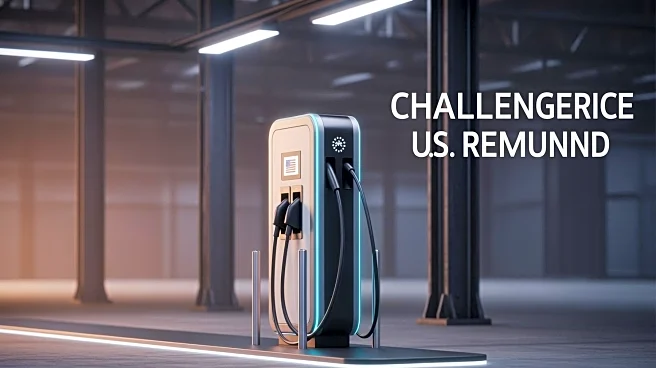What's Happening?
IndustryWeek's latest review highlights several key developments in the U.S. manufacturing sector. A significant focus is on the challenges faced by electric vehicle (EV) manufacturers, with GM executives
announcing a strategic shift in their EV operations due to market realities. This includes ending production of the BrightDrop electric delivery van. Meanwhile, Cleveland-Cliffs executives report a 'significant rebound' in steel demand, driven primarily by automotive customers, indicating a potential recovery in the sector. Additionally, Stellantis plans to invest $13 billion in the U.S., marking the largest investment in the company's history, aimed at strengthening its manufacturing footprint and creating more American jobs. The review also touches on the impact of tariffs and reshoring efforts, as well as GE Aerospace's $30 million investment in workforce training to support future manufacturing needs.
Why It's Important?
These developments are crucial for the U.S. manufacturing industry, which is navigating a complex landscape of economic challenges and opportunities. The shift in GM's EV strategy reflects broader market adjustments as companies adapt to consumer demand and regulatory environments. The rebound in steel demand suggests a potential upswing in manufacturing activity, which could have positive implications for employment and economic growth. Stellantis' substantial investment underscores the importance of foreign direct investment in bolstering U.S. manufacturing capabilities and job creation. Additionally, GE Aerospace's focus on workforce training highlights the need for skilled labor to drive innovation and maintain competitiveness in the global market. These factors collectively influence the trajectory of U.S. manufacturing and its ability to respond to evolving market conditions.
What's Next?
The U.S. manufacturing sector is likely to see continued adjustments as companies like GM refine their strategies to align with market demands. The steel industry's rebound may lead to increased production and investment, potentially boosting related industries. Stellantis' investment will likely result in expanded manufacturing facilities and job opportunities, contributing to economic growth. As tariffs and reshoring efforts continue to impact manufacturers, companies may explore new markets and strategies to mitigate these challenges. GE Aerospace's investment in workforce training is expected to enhance the skills of the manufacturing workforce, supporting future innovation and productivity. Stakeholders across the industry will be closely monitoring these developments to adapt their strategies accordingly.
Beyond the Headlines
The strategic shifts and investments highlighted in IndustryWeek's review may have broader implications for U.S. manufacturing policy and international trade relations. The focus on workforce training and investment in manufacturing capabilities could influence policy decisions related to education and labor. Additionally, the interplay between tariffs, reshoring, and market expansion may affect trade negotiations and economic diplomacy. As companies navigate these challenges, there may be increased emphasis on sustainability and innovation to maintain competitiveness. The evolving landscape presents opportunities for collaboration between industry leaders, policymakers, and educational institutions to address the needs of the manufacturing sector and ensure its long-term viability.









